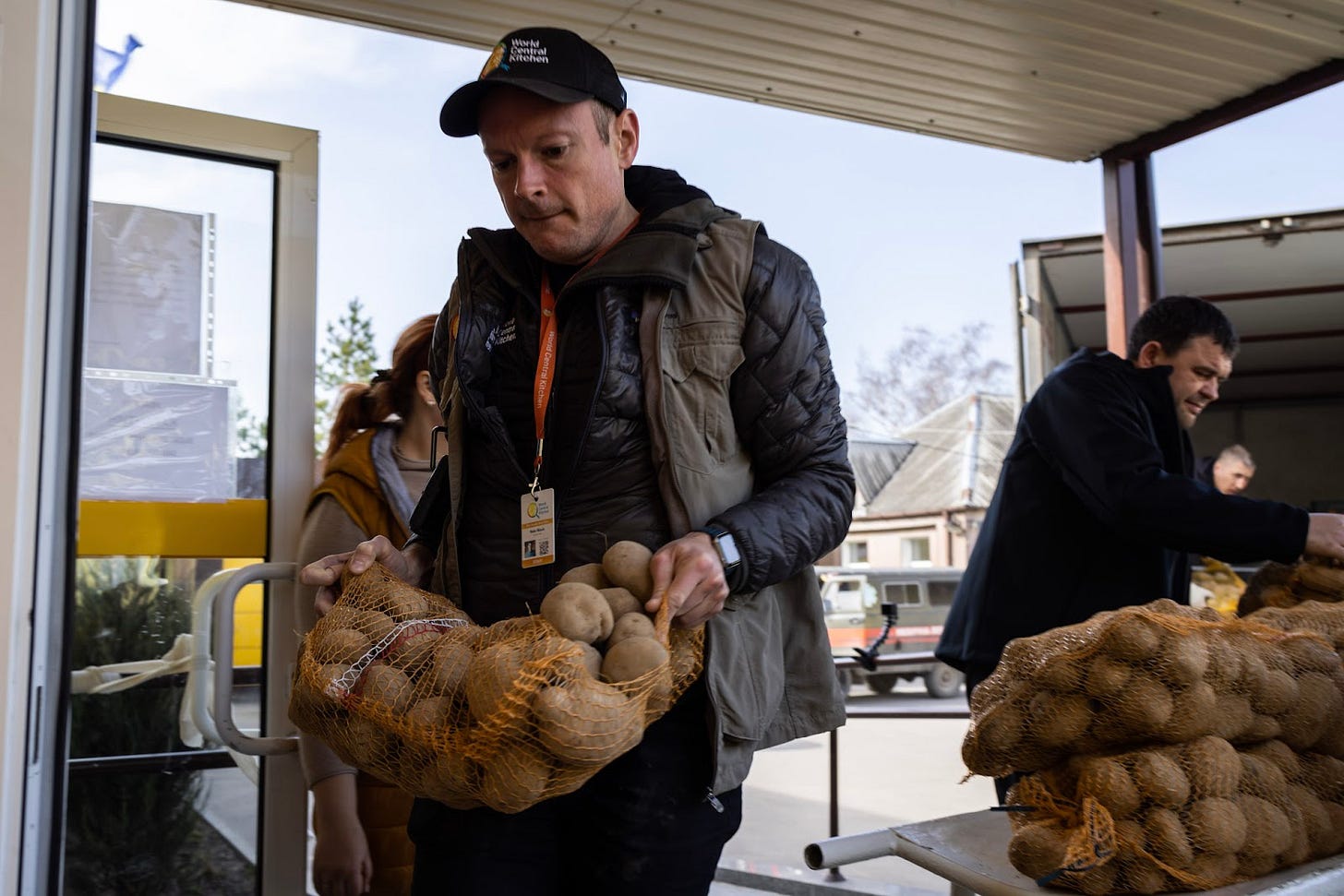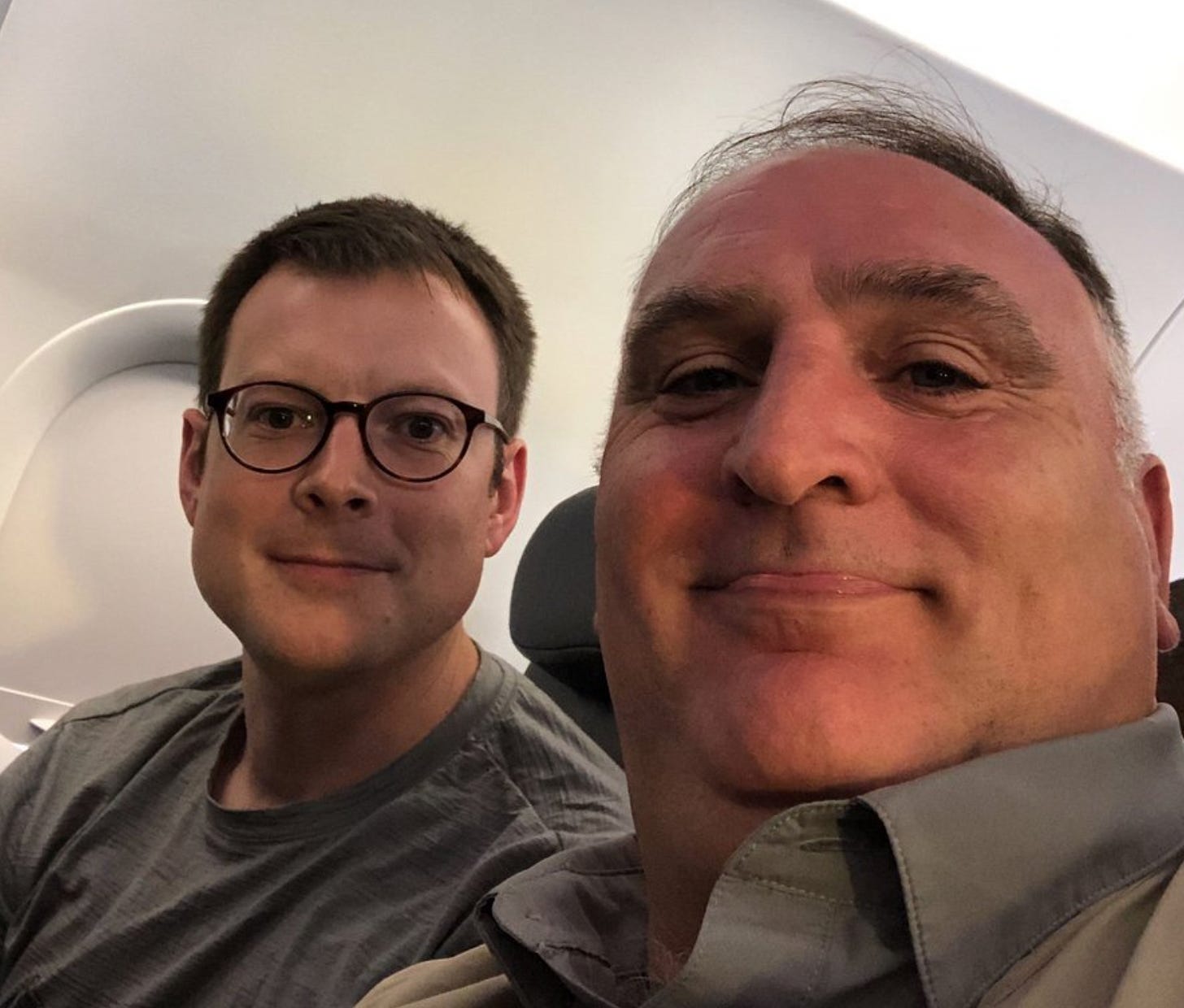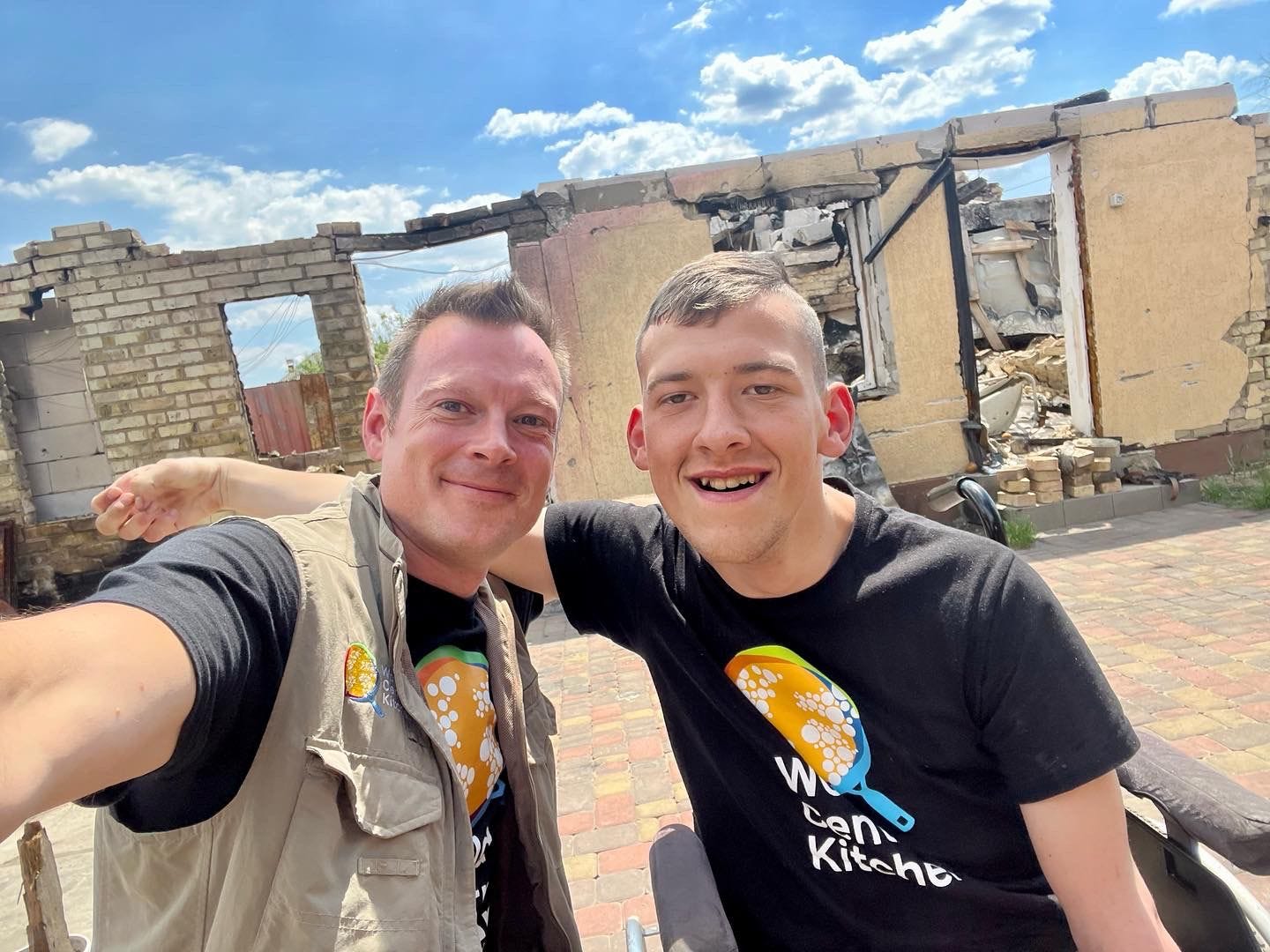Q&A with Nate Mook
The CEO of World Central Kitchen Shares Stories from a Decade in Disaster Relief
Hello People of Substack!
If you follow me on social media, maybe you know of my friend Nate Mook? He’s the CEO of World Central Kitchen, and he is very much the heart and an anchor of our disaster response work across the globe. He is truly one of my heroes.
Nate has been on the ground in Ukraine since just after the war began and is still spending most of his time there, coordinating WCK’s food supply chain, supervising much of the meal transportation, and managing partnerships with local restaurants and volunteers.
I met Nate many years ago, when the thought of World Central Kitchen was just a small idea in my brain. He was producing the TEDx Events and had been selected as a Gates Foundation “Change Hero” for lifting up the voices of underserved communities. You can understand why we hit it off right away.
The next year, I did a TEDx talk and reconnected with Nate, and of course we kept in touch. He became a film producer working on documentaries for the UN, USAID, and the World Bank; including the amazing documentary Baltimore Rising for HBO (which you should see if you haven’t).
In 2010, after the earthquake in Haiti, WCK was just getting off the ground. Nate and I were still in touch, and he agreed to work with me on a documentary about Haiti produced by National Geographic, which came out on PBS in 2015. Working with Nate it was very clear to me that we had a great partnership and a way of understanding each other. When Hurricane Maria hit Puerto Rico in 2017, I called Nate and told him I was going. Then he just showed up on the plane next to me! Nate ended up leading our efforts there … then our interim executive director, then hee became our CEO in 2018. Like I said, we clicked.
You can tell that I love Nate. He is our fearless, compassionate leader, one of the biggest heroes in our work, and I wanted you to get to know him a little better. I hope you enjoy the Q&A below! You can also follow Nate on Twitter or Instagram.
Longer Tables: When you first met José, you were a TEDx producer and he was a potential guest. Now you are the CEO of WCK. He must have made an impression on you!
Nate Mook: Yes, he did. Here is someone who didn’t have success or experience in the humanitarian space, but he just shows up and says let’s do this. He comes with so much vision and drive. What struck me the most was the simplicity of it all. He wasn't going to create something complicated and new. He thought about how people eat, how they cook, how they feed themselves, and how food is energy in and energy out. He realized that if you have to expend more energy getting and preparing food, than what you can consume, you will never rise up.
His formula was and still is really simple. When you have a medical crisis, you send in the doctors. When you have a food crisis, you need to send in the experts too—the cooks and the chefs of the world.
LT: I’d love to hear about your first trip together.
NM: We went to Haiti together in 2012 to film a documentary TV show. We wanted to tell a different story about Haiti. Our thought was: How would anything change there if the narrative is only about destruction and disease? Then no one will come visit, their economy will never come back. This is a country that shares the same piece of land with the Dominican Republic which is a huge tourist destination.
So we had this idea to do a TV show. But we didn't do it the regular way where you do a pilot and edit and try to sell it. We just went to Haiti and started filming. For two years in 2012 and 2013 we just worked, and it was only because of Jose’s sheer force of will and his personality that we got it done. That was how we started, with what would be called Undiscovered Haiti.
LT: What are some memories of working with José in those early days?
NM: I remember Hurricane Sandy right before we began filming in Haiti. I was living on the Lower East Side and José had come up to New York to see what he could do to help. We met one night and ended up going to a restaurant of a friend of his in DUMBO [in Brooklyn] that was flooded and destroyed. We showed up with food and helped out. In hindsight, that was the first hurricane that he engaged with, and that was how we saw that chefs could come together and feed each other.
LT: Tell me about the next disaster – Hurricane Maria.
NM: After Maria hit Puerto Rico in 2017, we flew down together. I had just finished a documentary with HBO about Baltimore, and I went with José to San Juan on the first flight down there. I thought we would be there for a few days, that we would donate some money and help out. But we found a terrible situation.
The entire island was impacted, over two million people. I remember everyone was talking about needing fuel, and we are like what about food? They had MREs [Meals Ready To Eat], which are shelf stable highly processed packaged foods. That’s the default for emergencies, but it’s not very edible. It’s not nourishment in the sense of food that tastes like home, that is made by someone. That’s what José wanted to do and that’s what we did do.
That was the moment for both of us that changed our lives. I was there for two months straight, and then I went to help with wildfires in California, but the team stayed down for much longer. We took the model we learned in Puerto Rico and ended up applying it to the California wildfires, and we have not stopped. We have been cooking somewhere in the world every day since Sept 25th, 2017.
LT: And now you are working in a war zone in Ukraine.
NM: Yes, we have been here since the second day of the fighting. We don’t usually respond to wars. We had never done so previously, so it was not really on our prime radar. But like everyone else, Ukraine was a situation we had been tracking closely, and as we saw the news that troops moved in on February 24th, we got on the phone with our teams and said we need to be ready to see what we can do.
Sam Bloch leads our emergency response, so he immediately jumped on a plane. On February 25th he was on the ground at the Poland border.
He immediately reported back to us and described what was going on. He said there were thousands of people — families, women, and children — waiting in mile-long lines to cross the border. He said it was taking a long time to cross over and it was freezing cold and there wasn't much help or assistance being provided at all. He said, “Let's start doing this.”
LT: After hearing from Sam, how long did it take you to get to Ukraine?
NM: Two days later José and I landed—on February 27th. We got to the Polish border and we started our refugee response work, focusing on those who were forced to flee. At that point, so early on in the war, we weren’t sure if we could get into Ukraine; people were saying Ukraine could fall, so it was too dangerous to go in. Once it became clear that the Ukrainians were holding the Russians back, then we knew we could go in and support. We reached out to Ukrainian chefs, and José and I drove across the border into Lviv, connecting with our partners there and started to grow the operation.
LT: War is different from disasters. Can you talk about the way war has impacted the work you do?
NM: Absolutely, yes. There are two big differences, safety being the first. In other disasters, like in Haiti, there were security problems, but we knew about them and we could work around them and operate in a fairly normal capacity. In Ukraine there are no guarantees. A missile can come out of nowhere, or artillery shells if you are too close to the Russian lines, so safety is our ultimate priority. We have decided to have minimal international staff in Ukraine and instead to support the Ukrainans who are there already supporting their communities. They were going to be there anyway, and this way we can support these local leaders without making international staff an additional target and the situation more dangerous.
The second difference is that this is a disaster that is still unfolding. We are not in the recovery phase. This is ongoing and getting worse in some cases every day. It’s like being in a hurricane that is still raging. Some places, sure, are better, but the reality is that Russian forces are still pushing forward and not giving up. But neither are we. Poland is safe so in those places we are okay to work, we will continue to work.
LT: Continuing on that line of thought — you've worked to provide refugee meals to people in all sorts of humanitarian disasters — how is this different in terms of production/cooking than operating in a hurricane or tornado?
NM: The main difference in Ukraine is the round-the-clock nature of the operation. In a hurricane we do lunch and dinner, but here, because families come across the border at all hours, that means working 24 hours a day. That’s such a complex and intensive response.
The scale is another difference. The number of people to feed is more than we have ever done before. We learned a lot during COVID about how to distribute mass feeding in a wide geographical area. We had thousands of restaurants feeding their communities and by activating local restaurants to pay them to produce meals for their local communities, we can feed many and empower local communities.
LT: Your work is so inspiring but must also be very draining. Can you share a low and a high point with us?
After the massacre in Bucha, which was definitely a low point, we went door to door to bring food to families that had survived, and we met a young man named Bogdan and his mother Lyuda. They live on Vokzalna Street which is now infamous because of the amount of carnage and destruction it suffered at the hands of the Russian army. It is the image of Bucha and the war crimes and horrors of this place.
Bogdan has cerebral palsy and is in a wheelchair, and on the day of the attacks, when the tanks rolled up their street, they had to get him down into their basement bunker. Somehow they managed. Their home burned to the ground, it is utterly destroyed. There is only a skeleton of a wall left. But they miraculously survived in the basement. Ludmilla says they will rebuild. She has a beautiful garden in the back that somehow survived.
When I went back recently, it was for Bogdan’s 24th birthday. Being there after the war crimes and being together to celebrate his birthday, and share a meal and cake, it was a really special moment, it was a high for sure. We brought him a new laptop because his old one was destroyed and he uses it to play chess; he is an amazing chess player. It was an amazing moment, to be amidst the destruction, and feel that joy of celebrating a birthday together. It was a reminder of humanity and hope and why we are here.
The numbers can be overwhelming — serving 1 million meals a day between all of our efforts — but this is what it is all about. These moments of one-on-one connections and giving toasts and sharing a meal at a table and looking towards a better future.








Thank you for this interview with Nate! He's a familiar face from IG, but it's nice to get background on him.
Thank you for helping us see the amazing humans behind WCK, like Nate Mook, and also giving us a glimpse of your impact on survivors, the humans you support.